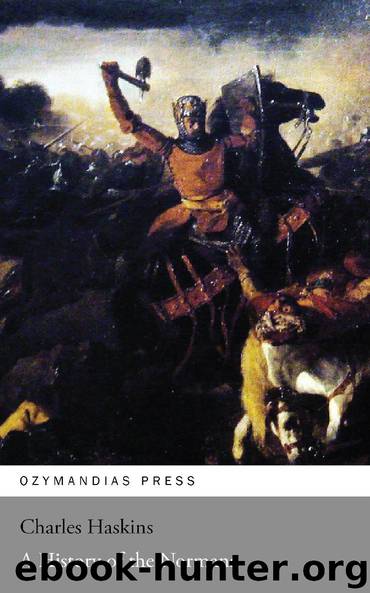A History of the Normans by Charles Haskins

Author:Charles Haskins
Language: eng
Format: epub
Publisher: Ozymandias Press
NORMAN LIFE AND CULTURE
~
IN TURNING FROM THE GENERAL course of Norman history in the eleventh and twelfth centuries to examine Norman life and culture in this period, we encounter the difficulties inherent in any attempt to cut a cross-section of human society in an age which was not conscious of being a society and has left us for the description of itself only raw materials of a fragmentary and uneven sort. The chroniclers confine themselves almost entirely to external events, the charters deal chiefly with land and boundaries and rights over the land, much of the literature is theological commentary or rhetorical commonplace which reflects nothing of the age in which it was written; what is lacking in all is the concrete detail of daily life from which alone social and economic conditions and even government itself can be understood. And when we have pieced together as best we may some notions of Normandy in this period, our knowledge of the parallel conditions in other regions is often so inadequate that we cannot be certain how far our results are characteristic of Normandy, how far typical of the time, or, because of the scattered nature of our material, how far they may be merely individual and isolated. Much of the social history of the Middle Ages is still unwritten; for lack of evidence much can never be written. Until the available sources have been more fully explored, nothing beyond a provisional sketch can be attempted.
Fortunately for our purposes, the fundamental structure of society in the earlier Middle Ages was exceedingly simple. There were three classes, those who fought, those who labored, and those who prayed, corresponding respectively to the nobles, the peasants, and the clergy. Created by the simple needs of the feudal age, this primitive division of labor was even declared an institution of divine origin and necessary to the harmonious life of man. It seemed right and natural that the nobles should defend the country and maintain order, the clergy lead men to salvation, the peasants support by their labor these two beneficent classes, as well as themselves. As an ideal of social organization, this system of classes is open to obvious objections, not the least of which is the persistent killing and plundering of the peasants by the class whose function it was to protect and defend them; but as a description of actual conditions, it expresses very well the facts of the case.
With respect to the fighting class, it is characteristic of the Norman habit of order and organization that the military service of the nobles was early defined with more system and exactness in Normandy than in the neighboring countries of northern France. We have already seen that at a period well before 1066 the amount of service due from the great lords to the duke had been fixed in rough units of five or multiples of five, and these again subdivided among their vassals and attached to specific pieces of land which were hence
Download
This site does not store any files on its server. We only index and link to content provided by other sites. Please contact the content providers to delete copyright contents if any and email us, we'll remove relevant links or contents immediately.
| Africa | Americas |
| Arctic & Antarctica | Asia |
| Australia & Oceania | Europe |
| Middle East | Russia |
| United States | World |
| Ancient Civilizations | Military |
| Historical Study & Educational Resources |
Life of Elizabeth I by Alison Weir(2079)
The Invisible Wall by Harry Bernstein(1799)
Art of Betrayal by Gordon Corera(1429)
1916 in 1966 by Mary E. Daly(1282)
Thunderstruck by Erik Larson(1260)
The Decline and Fall of the British Empire, 1781-1997 by Piers Brendon(1124)
A Brief History of Britain, 1066-1485 by Nicholas Vincent(1038)
A Brief History of Britain, 1485-1660 by Ronald Hutton(1008)
Guy Burgess by Stewart Purvis(1004)
Mary, Queen of Scots by Weir Alison(990)
Henry VIII by Alison Weir(937)
The Last Lion 02 - Winston Churchill - Alone, 1932-1940 by William Manchester(934)
Fifty Years On by Malachi O'Doherty(909)
Lang Lang by Lang Lang(877)
1066 by Andrew Bridgeford(859)
Gimson's Kings and Queens by Andrew Gimson(856)
Coalition by David Laws(840)
The Last Plantagenet by Thomas B Costain(838)
London: A Biography by Peter Ackroyd(830)
